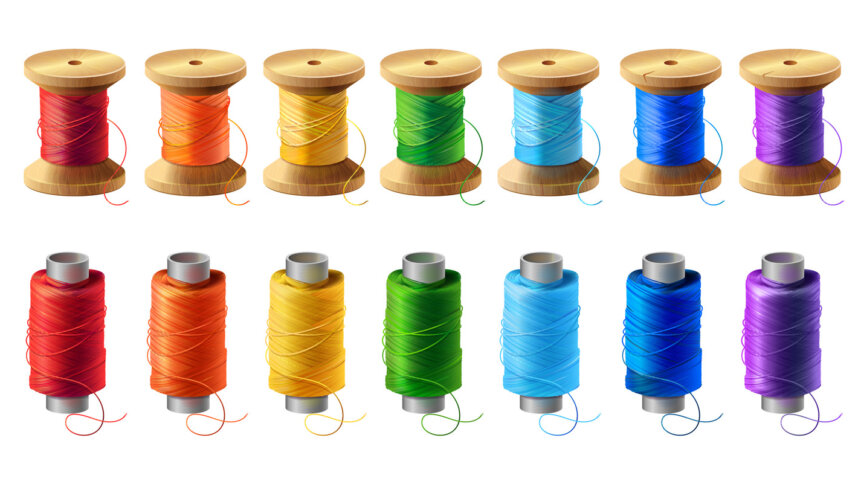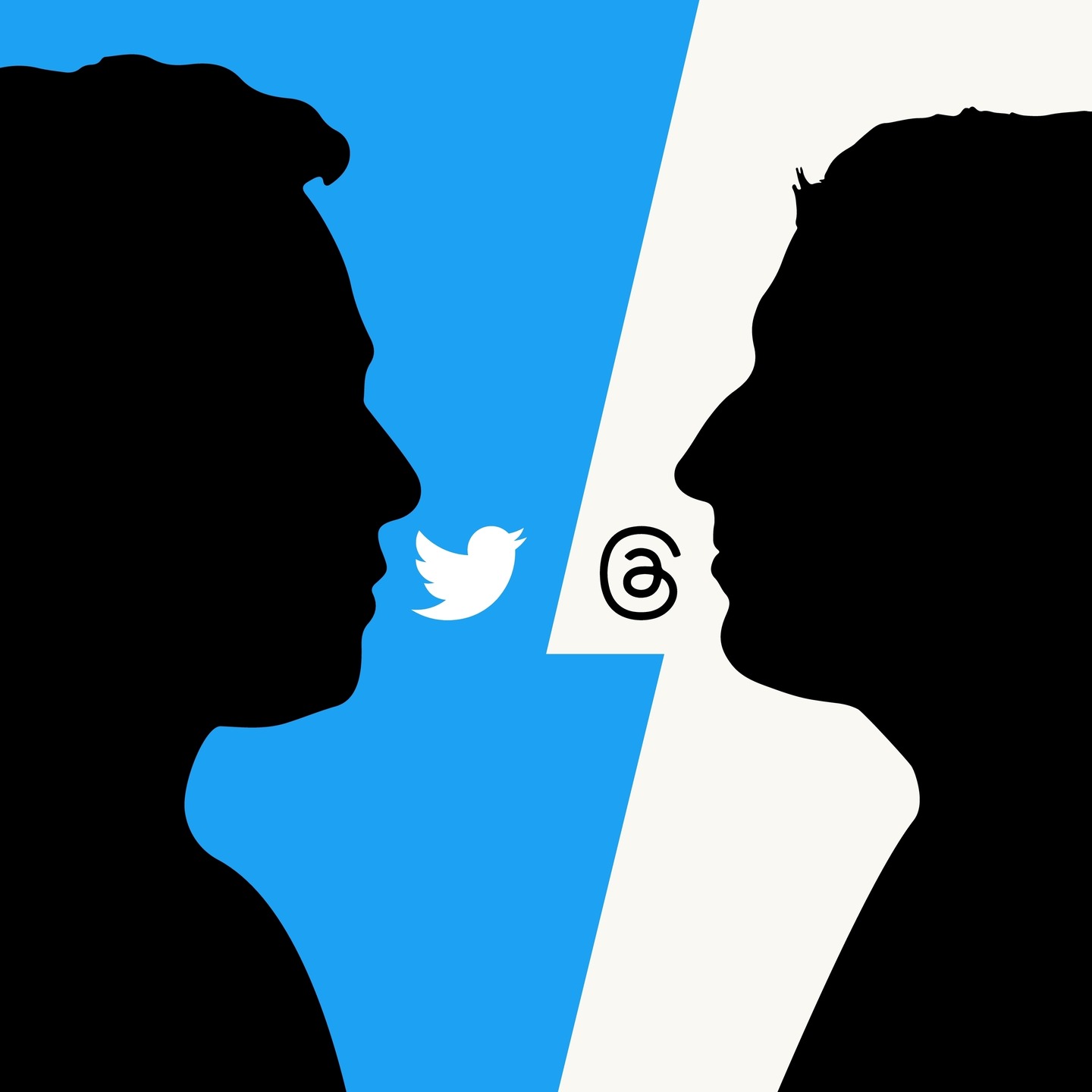Threads – is it really the new Twitter?

• Threads is billed as a calmer, less hectic Twitter variant.
• Owned by Meta, it grew rapidly in its early days.
• Despite losing half its members, Threads has the backing to outlast the more erratic Twitter.
In late 2022, you’d have been forgiven for thinking the paranoia was right, and that AI had taken over the world.
Five days after the initial release of OpenAI’s ChatGPT, on November 22nd, the groundbreaking language model reached one million users. Not impressed? For context, Instagram took 2.5 months to reach one million downloads, and Netflix, which evolved from a pre-existing disc-based postal model, took three and a half years to reach the same landmark.
Unsurprisingly, ChatGPT became the record holder for the fastest platform growth in history (it reached 10 million users in just five weeks). But the record has since been broken by Meta Threads, which has been likened to a “non-racist Twitter.” Threads was launched on July 6th, 2023, and took only seven hours to break ChatGPT’s record. In a mere 24 hours, 30 million users had signed up to Threads. By the end of the weekend, the number had grown to a mind-boggling, almost inconceivable 100 million.
Threads explained – like Twitter, but not Twitter
Threads may have passed some of us by, however, because it still hasn’t been launched in the EU. Meta decided not to make it available in Europe due to “upcoming regulatory uncertainty,” which seems to be in relation to the EU’s Digital Markets Act (DMA). Given the closed door to a huge global market, it’s arguable that the platform’s record-breaking growth is even more remarkable than it first appears.
So, what exactly is Threads? It’s been described as “a new app, built by the Instagram team, for sharing text updates and joining public conversations.” Threads was designed by Meta, parent company to Facebook, WhatsApp and Instagram as a kind of alternative to Twitter, but without some of the racial and political sturm and drang that has infected that app since the bird-app that’s no longer a bird-app ditched most of its content moderation team. Threads can also be described, without fear of contradiction, as a Twitter variant for people fed up with the dark whimsy of new owner Elon Musk.
Currently available as an app on iOS and Android devices, users log in to Threads via their Instagram accounts. From there, they can write posts up to 500 characters, 220 more than Twitter’s (though with the changing logo and branding, we’re sure that will soon change). Moreover, Thread posts can include links and videos up to five minutes long.
Nothing there stands out as exceptional, we know, but the platform is still very young. Many features, such as direct messaging and a “following” feed, are still being managed by developers, so it wouldn’t be out of the question to see it become available on laptops and desktops in the near future.
Threads vs Twitter
Threads has had a profound impact on the social media landscape already. For instance, Twitter has seen a decline in traffic since Threads’ launch.
Yes, another one.
Meta has also promised a more positive environment for users on Threads, with it being promoted as a “Public Square.” For those who have not yet embraced or even used Twitter, perhaps due to reports of hate speech and mass misinformation, Threads could be the community they are looking for.
YOU MIGHT LIKE

Some Twitter alternatives that dodge Musk’s paywall

“Now I am become X, destroyer of Twitter…”
There’s no doubt that Threads has become Twitter’s biggest and newest rival, posing a significant threat to the platform. Over in Twitter land (Or should that now be The X Dimension?), life has been shaky since Elon Musk took over in October 2022. Due to some of his personal beliefs and certain changes to the platform, many users have been critical of it, with some reports predicting over 32 million users will leave the site in the next two years.
There’s no doubt that Twitter has been sailing on troubled waters in recent months and has gone from a place where intellectual chats were the pick of the day to a pool of bots and trolls. Add in the increased volume of hate speech on the platform, and it’s no wonder people are looking elsewhere for calmer waters. In fact, some found those calm seas in an earlier alternative, with the great Mastodon exodus.
But Mastodon’s de-centralized nature gave it barriers of understanding to overcome for many people, whereas Threads has the feel of an instinctive Twitter alternative.
If we tortuously over-extend the nautical metaphor, some users are happy to go “down with the ship” (White cross on a black background – in fairness, Twitter appears intent on turning itself into a pirate ship), rather than switch to using Meta products. After all, many Twitter users continue to love the platform and have a sentimental fondness for it after years of use.

Just add a skull and sail the Caribbean? The platform-formerly-known-as-Twitter.
As Twitter CEO Linda Yaccarino said after the Threads launch, “we’re often imitated – but the Twitter community can never be duplicated.” So far, this has been true, but Threads has already surprised the industry by its rapid take-up figures.
Threads content moderation
With a sudden burst of users on this new platform, there have been questions over how Meta will scale its content moderation operation. Remember, Threads accounts are connected to Instagram accounts. So, while users can deactivate their profiles, their data could still be stored on Meta’s servers for… well, forever. And it’s in no sense the case that Meta has been a white knight when it comes to content moderation or data misuse.
As Threads is linked to Instagram, Meta has stated that Instagram’s community guidelines are in place on Threads, underpinned by a hope to develop a more positive environment for users. Despite these positive promises, history tells us that phishing scams and misinformation will always get through the cracks. That’s “just what happens” when a platform has millions of users – the content moderation task quickly becomes overwhelming.
For now, it seems Instagram’s moderation infrastructure is applicable to Threads. For instance, if a user attempts to follow a profile that has shared misinformation repeatedly, the app will issue a warning. Yes, these moderation resources may work for now, but we’re sure Meta will have to work on new moderation formulae going forward, especially if Threads becomes a genuinely viable alternative to Twitter.
Data Privacy Concerns With Threads
Like many apps, Threads states that it may collect personal data from users when they download it on the Apple app store. This can include fitness and health, contacts, financial, and browsing history information. Where does this information go? Meta can share it with advertisers, so users can expect pop-up ads for fitness equipment tailored to their needs.
If you think Threads will respect your personal data privacy, think again. Further information, such as a user’s sexual orientation, race, and religion may also be collected. But, the data you share differs on iOS and Android devices, as the Google Play Store doesn’t demand as much data.
For users worried about the protection levels of their data on Threads, there are ways to safeguard profiles. One example is setting a Threads profile to Private, limiting visibility to “approved followers only.”
Users can also control who mentions them in posts, and hide certain words that they may find offensive. Like most social media platforms, users can also block or mute accounts (a handy feature most of us have used before). This can limit interactions that a user may deem bothersome or harmful.
If you start to use Threads and find it is not for you, it is possible to deactivate your profile. But, again, there’s a catch. Your data may remain stored on Meta’s servers indefinitely, as it is currently not possible to delete Threads data permanently.
Meta is yet to respond to news outlets regarding data privacy concerns specific to minors. And as with the Mastodon exodus, over half of those who initially signed up to Threads have subsequently left the app (leaving their data behind for the harvesting). So whether Threads will emerge as a genuine threat or successor to Twitter remains to be seen.

Threads vs Twitter – the cage fight we’re all involved in.
What can be said with a degree of certainty though is that of the possible rivals to Twitter’s newly X-shaped crown, Threads has the greatest likelihood of posing a threat to it, as Meta, unlike some of the other contenders, had more money than God, which translates into the patience to watch the adventures of X unfold, taking advantage whenever the platform-formerly-known-as-Twitter makes errors.









